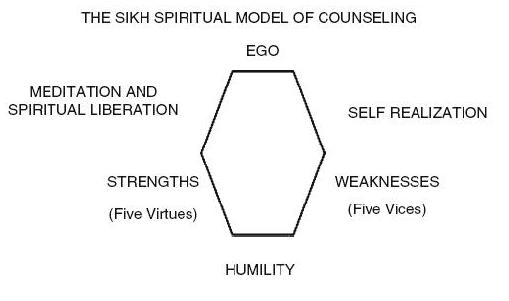
Despite the rich linguistic flexibility of Punjabi, it is telling that we do not have a single term for ‘depression.’ Mental health has been an ongoing conversation since the inception of the blog, repeatedly highlighted by Sundari and others. Often treatment is not sought and if it is sought it is usually terminated early as clients do not feel health professionals understand their world-view.
While we have numerous issues facing the Sikh community, there are few channels for those seeking mental health assistance. Thus, I was happily surprised when I came upon a medical article, titled “The Sikh Spiritual Model of Counseling.”
I reproduce the abstract in its entirety:
In accordance with the holistic principles of modern medicine, this paper will present the Sikh religious and spiritual view of mental health. With the continuing migration of a large number of South Asians, especially the Sikhs, to Western countries, mental health professionals should be aware of their clients’ world-view and cultural/religious specifi c models of counseling. Use of Sikh spirituality can reduce stress; help in treating psychosomatic disorders; and improve mental health of the individual and of the community. This paper will conclude that as the Sikh religion is a universal religion, everyone can use Sikh spirituality.
Dr. Kala Singh, the author of the article, is a physician that works as a multicultural mental-health liaison at Vancouver Coastal Health. I also want to personally thank the author for sending me a copy of his article!
In a previous interview, Dr. Singh, cautioned that:
“A lot of people believe that mental illness is not a doctor’s problem but a supernatural problem,” Singh explains in a telephone interview. “They’ll worry about the ‘evil eye’ and might go to a priest for help.” (The evil eye is a metaphor in some cultures for disease or misfortune.)[link]
While here on TLH we have discussed such scams in the past, Dr. Singh does give a prescription for a competent counselor:
-
be aware of his/her own assumptions, values and biases;
-
understand the worldview of the culturally different client; and
-
develop appropriate intervention strategies and techniques (Sue et al., 1982).
Dr. Singh pushes his Sikh patients to live their life close to Sikh practices. He writes:
Sikhism does not believe that mental illnesses are caused by spirit possession or violation of some religious principles and healing done through supernatural powers or rituals. In fact the third Guru made hospitals to treat the sick, the fifth Guru treated lepers and the eighth Guru treated smallpox patients. I use this to counsel clients who are superstitious and think that their problems are due to witchcraft and do not take medicine.
And:
Guru Nanak Dev conferred dignity on women and raised their status in society…I use this in counseling couples presenting with spousal abuse.
These are definitely needed reminders and it is wonderful that even in a clinical setting, Dr. Singh can be effective with his Sikh patients. It also seems that he is achieving results:
Sikhs, like other South Asians, do not believe in talk therapy. However, the number of clients seeking counseling has shown a manifold increase since the author started using Sikh religion and spirituality as the basis for counseling.
Dr. Singh provides successful case studies where invoking Sikh spiritual self-realization, practices, and history worked with both practicing and non-practicing Sikh males in cases of domestic violence and depression.
Dr. Singh sees the usage of Sikh spirituality principles extending to far more than just the Sikh community. He concludes:
Mental health professionals should use cultural/religious specific models of counseling. As the Sikh religion is a universal religion, this model can be used in conjunction with Western counseling for everyone. There is also great scope for the use of Sikhism in the preventive, promotive and curative aspects of mental health. With all these qualities, the Khalsa (Baptized Sikh) is the ideal future international hope for humanity. The need of the day is to enable these principles to reach mankind all over the world.
I was enthralled to read the article. I hope others share my excitement and would love to hear your thoughts.

